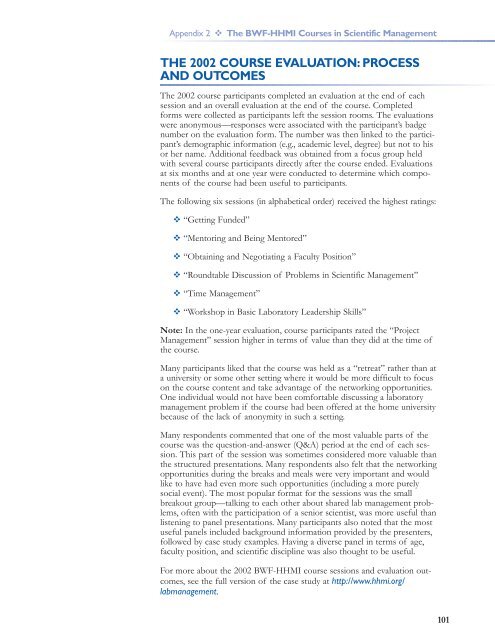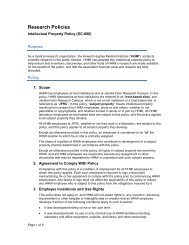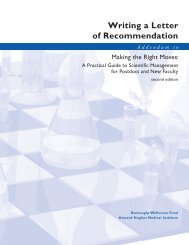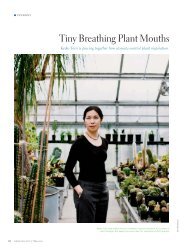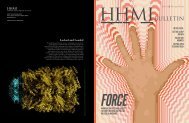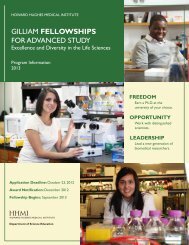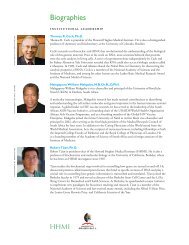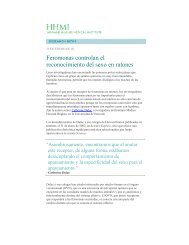Training Scientists to Make the Right Moves - Howard Hughes ...
Training Scientists to Make the Right Moves - Howard Hughes ...
Training Scientists to Make the Right Moves - Howard Hughes ...
You also want an ePaper? Increase the reach of your titles
YUMPU automatically turns print PDFs into web optimized ePapers that Google loves.
Appendix 2 The BWF-HHMI Courses in Scientific Management<br />
THE 2002 COURSE EVALUATION: PROCESS<br />
AND OUTCOMES<br />
The 2002 course participants completed an evaluation at <strong>the</strong> end of each<br />
session and an overall evaluation at <strong>the</strong> end of <strong>the</strong> course. Completed<br />
forms were collected as participants left <strong>the</strong> session rooms. The evaluations<br />
were anonymous—responses were associated with <strong>the</strong> participant’s badge<br />
number on <strong>the</strong> evaluation form. The number was <strong>the</strong>n linked <strong>to</strong> <strong>the</strong> participant’s<br />
demographic information (e.g., academic level, degree) but not <strong>to</strong> his<br />
or her name. Additional feedback was obtained from a focus group held<br />
with several course participants directly after <strong>the</strong> course ended. Evaluations<br />
at six months and at one year were conducted <strong>to</strong> determine which components<br />
of <strong>the</strong> course had been useful <strong>to</strong> participants.<br />
The following six sessions (in alphabetical order) received <strong>the</strong> highest ratings:<br />
“Getting Funded”<br />
“Men<strong>to</strong>ring and Being Men<strong>to</strong>red”<br />
“Obtaining and Negotiating a Faculty Position”<br />
“Roundtable Discussion of Problems in Scientific Management”<br />
“Time Management”<br />
“Workshop in Basic Labora<strong>to</strong>ry Leadership Skills”<br />
Note: In <strong>the</strong> one-year evaluation, course participants rated <strong>the</strong> “Project<br />
Management” session higher in terms of value than <strong>the</strong>y did at <strong>the</strong> time of<br />
<strong>the</strong> course.<br />
Many participants liked that <strong>the</strong> course was held as a “retreat” ra<strong>the</strong>r than at<br />
a university or some o<strong>the</strong>r setting where it would be more difficult <strong>to</strong> focus<br />
on <strong>the</strong> course content and take advantage of <strong>the</strong> networking opportunities.<br />
One individual would not have been comfortable discussing a labora<strong>to</strong>ry<br />
management problem if <strong>the</strong> course had been offered at <strong>the</strong> home university<br />
because of <strong>the</strong> lack of anonymity in such a setting.<br />
Many respondents commented that one of <strong>the</strong> most valuable parts of <strong>the</strong><br />
course was <strong>the</strong> question-and-answer (Q&A) period at <strong>the</strong> end of each session.<br />
This part of <strong>the</strong> session was sometimes considered more valuable than<br />
<strong>the</strong> structured presentations. Many respondents also felt that <strong>the</strong> networking<br />
opportunities during <strong>the</strong> breaks and meals were very important and would<br />
like <strong>to</strong> have had even more such opportunities (including a more purely<br />
social event). The most popular format for <strong>the</strong> sessions was <strong>the</strong> small<br />
breakout group—talking <strong>to</strong> each o<strong>the</strong>r about shared lab management problems,<br />
often with <strong>the</strong> participation of a senior scientist, was more useful than<br />
listening <strong>to</strong> panel presentations. Many participants also noted that <strong>the</strong> most<br />
useful panels included background information provided by <strong>the</strong> presenters,<br />
followed by case study examples. Having a diverse panel in terms of age,<br />
faculty position, and scientific discipline was also thought <strong>to</strong> be useful.<br />
For more about <strong>the</strong> 2002 BWF-HHMI course sessions and evaluation outcomes,<br />
see <strong>the</strong> full version of <strong>the</strong> case study at http://www.hhmi.org/<br />
labmanagement.<br />
101


